Papers by Constantin Bratianu

Knowledge
Although there is a long history of searching for the road from knowledge to wisdom, there is no ... more Although there is a long history of searching for the road from knowledge to wisdom, there is no final and clear result. In fact, there are multiple ways of starting from knowledge and reaching wisdom due to the complexity of the semantic domains of both concepts. In addition, there are different perspectives on interpreting these conceptual maps, ranging from philosophy to psychology or management. We are interested in understanding the connecting ideas between knowledge and wisdom from the management perspective, where decision making is the key driving force for transforming knowledge into efficient actions for creating value for customers through products and services. The well-known knowledge pyramid or wisdom pyramid is a good metaphor to start with in understanding the basic concepts of data, information, knowledge, and wisdom (DIKW) and their transformations. We analyze different interpretations of these four basic concepts and focus on the transition from knowledge to wisdo...

Knowledge Management and Organizational Learning, 2017
Knowledge has long been accepted as a strategic asset to achieve and maintain competitive advanta... more Knowledge has long been accepted as a strategic asset to achieve and maintain competitive advantage. The purpose of this chapter is to show how, in the literature, the connection between knowledge and strategy has been more or less clearly underlined. In the first part of this chapter, we will show why knowledge is increasingly considered one of the fundamental elements of value creation in business. Its strategic attribute became essential especially in the last decades, due to the turbulence of the business environment. Since the creation of economic value is the most important requirement for achieving success, this soon brings us to the idea of a strategy as a means of realizing it. In Sect. 3.2, a discussion about the notion of strategy will be provided, starting with the military original meanings of it. In Sect. 3.3 we will show how this notion has evolved over time as a result of a new equilibrium of forces between internal and external business environment. Finally, we will illustrate that knowledge has always been a central element in all the various perspectives on strategy and strategic thinking that can be found in the literature and managerial practice.
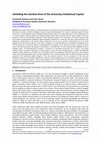
The purpose of this paper is to demonstrate that the Gordian Knot of the intellectual capital of ... more The purpose of this paper is to demonstrate that the Gordian Knot of the intellectual capital of the universities is the structural capital, and that unfolding it requires a deep understanding of the nature of structural capital This idea comes from a new perspective on the intellectual capital structure and on the relative importance of each component of it, i.e. human capital, structural capital and relational capital. Many authors consider that the human capital is the most important and by far the dominant component of the intellectual capital of the universities. Our research based on the new concept of organizational intellectual capital integrators showed that a university may have a great potential of the intellectual capital based on the human capital component, and yet not to perform competitively due to the weak integrators and stiff structural capital. In our view, an integrator is a powerful field of forces capable of combining two or more elements into a new entity, ba...
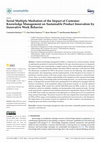
Sustainability, 2021
Customer knowledge management (CKM) is a relatively new research domain, aiming at exploring the ... more Customer knowledge management (CKM) is a relatively new research domain, aiming at exploring the potential of customer knowledge for the open innovation process of companies. The present paper aims at performing a complex analysis of the serial mediation phenomenon of the impact of CKM on sustainable product innovation (SPI) by innovative work behavior (IWB). The dimensions considered for IWB in the present research are the following: idea exploration, idea generation, idea championing, and idea implementation. In the first phase of our research, we performed a semantic analysis of the main concepts, ideas, and theories, based on a critical literature review. Thus, we reached a deeper understanding of the complexity of the concept of knowledge by learning the theory of knowledge fields and knowledge dynamics. As a result of this conceptual phase, we designed the research model and a questionnaire to be addressed to managers from the business environment. In the quantitative phase of...
The AMFITEATRU ECONOMIC journal, 2016
Die Dokumente auf EconStor dürfen zu eigenen wissenschaftlichen Zwecken und zum Privatgebrauch ge... more Die Dokumente auf EconStor dürfen zu eigenen wissenschaftlichen Zwecken und zum Privatgebrauch gespeichert und kopiert werden. Sie dürfen die Dokumente nicht für öffentliche oder kommerzielle Zwecke vervielfältigen, öffentlich ausstellen, öffentlich zugänglich machen, vertreiben oder anderweitig nutzen. Sofern die Verfasser die Dokumente unter Open-Content-Lizenzen (insbesondere CC-Lizenzen) zur Verfügung gestellt haben sollten, gelten abweichend von diesen Nutzungsbedingungen die in der dort genannten Lizenz gewährten Nutzungsrechte. Terms of use: Documents in EconStor may be saved and copied for your personal and scholarly purposes. You are not to copy documents for public or commercial purposes, to exhibit the documents publicly, to make them publicly available on the internet, or to distribute or otherwise use the documents in public.
The purpose of this paper is to analyze the organiz ational intellectual capital as an integral r... more The purpose of this paper is to analyze the organiz ational intellectual capital as an integral result of a generative proce ss. The dynamics of this process is based on some core integrators. Each int egrator acts on some constitutive organizational elements and by combini ng them produces a result whose magnitude is larger than the sum of individua l contributions. The resultant organizational intellectual capital is no t exactly a multiplier of these basic individual components since tacit and explici t knowledge have a nonlinear nature and they cannot be combined based on linear laws. We are going to analyse the following organizational integ rators: technology and its associated processes, management and leadership, vi sion and mission, and organizational culture.

Abstract: Knowledge strategy is a new semantic construct that reflects the integration process of... more Abstract: Knowledge strategy is a new semantic construct that reflects the integration process of Knowledge Management and Strategic Management . It is a construct aiming at creating new value by considering knowledge as a strategic resource in managerial decision making. The way knowledge strategy and its planning can be seen is affected by the consideration of uncertainty and environmental turbulence. In a highly predictable environment, knowledge strategy can be seen as a rational approach, where knowledge resources and the processes to achieve and manage them can be set and planned in advance. However, in a turbulent business environment and continuous struggle for achieving a competitive advantage, strategic thinking and planning implies different approaches. Strategic thinking and organizational knowledge integrated in a powerful vision can help managers and business leaders in defining a spectrum of possible futures and transforming some of them into probable and desirable fu...
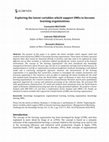
Management & Marketing. Challenges for the Knowledge Society, 2020
The purpose of this paper is to explore the latent variables which support small and medium-sized... more The purpose of this paper is to explore the latent variables which support small and medium-sized enterprises (SMEs) in becoming learning organizations. These latent variables represent abstract ideas that cannot be measured directly in practice, and they need to be explored by using different sets of other variables or indicators defined specifically for certain research of the business environment. The concept of “the learning organization” has been introduced into knowledge management literature about 30 years ago, but due to its complexity and high level of abstractness, its implementation in real life or organizations produced insufficient results for developing a well-defined model and a convincing managerial approach. However, the attractiveness of the learning organization is so appealing that researchers continue to investigate the complex mechanisms and processes supporting it. Our research is such an effort in exploring the latent variables for the small and medium-sized ...

Knowledge Management and Organizational Learning, 2017
The purpose of this chapter is to show that knowledge management emerged as a necessity in the po... more The purpose of this chapter is to show that knowledge management emerged as a necessity in the post-industrial society and the new knowledge economy. Instead of starting from defining knowledge management and describing its functions to create a prescriptive framework, the chapter begins with the broad picture of the changes in the structure of economy and in its critical assets. These changes produced a new type of economy where scarcity of tangible resources has been replaced by the affluence of intangible resources, and the economic theories of resource optimization and profit maximization have been aligned to knowledge creation and business sustainability. The engine of knowledge economy is the knowledge-based organization, where the pressure of efficiency and productivity should be relaxed. Instead, there is a need to develop new metrics able to measure the quality of knowledge and to evaluate the contribution of organizational learning to the firm’s performance. Finally, the chapter presents the new attributes of knowledge workers and knowledge processes. Knowledge creation, acquisition, storing and retrieving, sharing and distribution, transformation and use become the components of knowledge management. Since knowledge and its functions constitute strategic resources, knowledge management bridges the gap between operational management and strategic management.

Knowledge Management and Organizational Learning, 2017
Knowledge is an abstract concept without any reference to the tangible world. It is a very powerf... more Knowledge is an abstract concept without any reference to the tangible world. It is a very powerful concept, yet it has no clear definition so far. From the Greek philosophers up to present experts in knowledge management, people tried to define knowledge but the results are still very fuzzy. This chapter has the intention of showing the most significant aspects of the dispute over the definition of knowledge, and the main conceptual barriers in that endeavor. In the first part of the chapter we discuss about the knowledge nature and the attempts made in epistemology to define knowledge. The well-known definition that knowledge is justified true belief is shown to have the limitations given by the justification condition and the truth nature. In the second part, we consider the metaphorical approach to knowledge explanation and we present the main metaphors used for knowledge in the managerial literature: knowledge as objects, knowledge nuggets, knowledge as an iceberg, and knowledge as stocks and flows. In the last part, we introduce a new paradigm of metaphorical thinking based on the knowledge energy. This metaphor opens new opportunities for understanding knowledge as a multi-field paradigm composed of the rational, emotional, and spiritual knowledge fields.
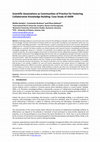
Electronic Journal of Knowledge Management, 2021
Knowledge building is a social process that is driven by the willingness of people to share their... more Knowledge building is a social process that is driven by the willingness of people to share their expertise and create new knowledge. Scientific Communities of Practice (CoPs) are communities of professors and researchers whose aim is to foster scientific knowledge generation. In the KM literature, research concerning this kind of CoPs has been substantially neglected so far. The present research analyses the case study of the International Association for Knowledge Management (IAKM) seen as a scientific CoP where members are mostly academics with research interests in developing and promoting knowledge management. Based on a collection of quantitative and qualitative data about member collaborations and scientific production, the study investigates the structure of interactions and the collaborative processes of IAKM members and the specific mechanisms of knowledge building within this CoP, seen as a paradigmatic example of scientific community. Members were asked to respond to a s...

Sustainability, 2020
The fast and unpredictable changes in the business environment lead to significant changes in the... more The fast and unpredictable changes in the business environment lead to significant changes in the future job market. For current business students, the future will offer many new opportunities for their employment but, at the same time, it will also create many threats disguised in the disappearing jobs. Business education centered mainly on knowledge transmission is challenged to switch towards a competence-based approach which includes knowledge, skills, and attitudes. The present research focuses on the need to change the paradigm of business education by creating a new learning environment centered on business competencies, and on a new knowledge ecosystem dynamics. The approach uses both qualitative and quantitative methods. In the first phase the research is focused on a critical literature review, and extraction of ideas for the next phase based on quantitative methods. In order to evaluate the students’ perception on the need of competence-based business education, a questio...
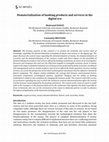
Management & Marketing. Challenges for the Knowledge Society, 2019
The primary purpose of this research is to present the evolution and current state of knowledge r... more The primary purpose of this research is to present the evolution and current state of knowledge regarding the dematerialization of banking products and services in the digital age. The paper discusses the central issues regarding the dematerialization of money, the dematerialization of securities and the dematerialization of the contract, trends with direct impact on the possibility of dematerializing the products and services offered by banking institutions, by means of an investigative discourse and viewpoint into and over the shift from tangible to intangible monetary assets. It mainly explores the impact of dematerialization on certain processes performed by banks (customer enrollment and management) and on certain products and services offered by banks (payment services, lending services, etc.) from the perspective of the latest technological innovations and the influence exerted by fintech companies. The chapter clearly establishes the synergy link between environmental factor...
Knowledge Management and Organizational Learning, 2018
The use of general descriptive names, registered names, trademarks, service marks, etc. in this p... more The use of general descriptive names, registered names, trademarks, service marks, etc. in this publication does not imply, even in the absence of a specific statement, that such names are exempt from the relevant protective laws and regulations and therefore free for general use. The publisher, the authors and the editors are safe to assume that the advice and information in this book are believed to be true and accurate at the date of publication. Neither the publisher nor the authors or the editors give a warranty, express or implied, with respect to the material contained herein or for any errors or omissions that may have been made. The publisher remains neutral with regard to jurisdictional claims in published maps and institutional affiliations.
Challenges, Performances and Tendencies in Organisation Management, 2016

Management Dynamics in the Knowledge Economy Journal, Jun 5, 2014
According to Daniel Kahneman (2011), our thinking process is based on two systems: system 1 opera... more According to Daniel Kahneman (2011), our thinking process is based on two systems: system 1 operates automatically and quickly, with little awareness of voluntary control, system2 operates slowly and constructs thoughts in a logic order. System 1 processes actually emotional knowledge using our unconscious cognitive capability. Cognitive scientists discovered that we are primarily emotional decision makers, which means that managers and leaders need to rely on their emotional knowledge. e purpose of this paper is to present a qualitative and quantitative research concerning the paradox of emotional knowledge. at means that on one hand most of us ignore emotional knowledge by identifying knowledge with cognitive knowledge, and on the other hand by using emotional knowledge in decision making. e qualitative research has been done by re ecting on knowledge management, strategic management and change management literature concerning emotional knowledge and emotional intelligence, while the quantitative research has been done by conceiving a questionnaire and using it in an academic environment. A total of 1200 questionnaires were distributed to the students of Bucharest University of Economic Studies, and we got a response rate of 37%. Each questionnaire contains 40 questions concerning the awareness, education, transfer, and management of emotional knowledge. e data has been processed with the help of the specialized so ware SPSS version 19, and AMOS version 18. Statistical analysis includes both exploratory and con rmatory factorial analysis. e results of the statistical analysis reveal the main in uence factors a ecting our understanding of emotional knowledge, the way we learn through education about emotional knowledge, the way this knowledge is transferred, and the importance of using it by managers and leaders.
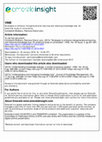
VINE, 2015
Purpose– The purpose of this paper is to identify and analyze the main strategies used in organiz... more Purpose– The purpose of this paper is to identify and analyze the main strategies used in organizations to enhance intergenerational learning (IGL) and reduce knowledge loss. The emphasis is on universities that have an age layered or nested structure.Design/methodology/approach– The research is based on an integrated approach of literature search, content analysis, survey based on interviews and questionnaires and the analytic hierarchy process method. The research questions are as follows: What is the level of awareness in organizations about knowledge loss and the role of IGL in reducing its consequences? What kind of organizational structure is adequate for promoting IGL? What are the most suitable strategies for enhancing IGL and reducing knowledge loss?Findings– Universities have a nested generational structure, which makes them adequate for IGL. The most used strategies for enhancing IGL are mentoring, intergenerational research teams and intergenerational creativity workshop...
This volume comprises the full proceedings of the second edition of the Strategica International ... more This volume comprises the full proceedings of the second edition of the Strategica International Conference, held in Bucharest, Romania, on October 2-3, 2014. The conference explores the organizational strategic thinking, planning and action in the context of new governments' policies and international institutions' measures after-crisis, as well as considering the evolutions within businesses. The focus is set on the relationships between management, finance and ethics. As an overview, the conference papers are interdis-ciplinary and aim at exploring the shifts in management, as well as the relevance of ethics, values and standards at individual , institutional and social levels in the world of finance and business, considering both the macro-level and the micro-level approaches.
Professional Development and Workplace Learning: Concepts, Methodologies, Tools, and Applications










Uploads
Papers by Constantin Bratianu
Foreword
Economics and Business
Arsim GJINOVCI
Difficulties facing the organization, promotion of HR and how to encourage or to motivate investments in organizations
Eduart LIKA
The role of remittances in the Albanian economy
Steliana MORARU
The impact of using mobile technology for the development of the Non-profit Sector in Romania
Erdet KËLLIÇI
Increase organization overall performance through mobile technology. Albania case study
Agata BALIÑSKA
Factors determining the development of peripheral areas
Dumitru IACOB, Ștefan STÃNCIUGELU
Socioenergy, co-existence and co-evolution: key factors of a Romanian national development strategy
Denisa MAMILLO
The effect of organizational culture and uncertainty on supply chain collaboration. The case of Albanian beer producers
Cristian PÃUN
The role of European Union Funds in economic development
Andrei-Alexandru MOROȘAN, Cristian-Valentin HAPENCIUC,
Iulian CONDRATOV
The effects of structural funds absorption on the business environment in the North-Eastern Region of Romania
Bajram FEJZULLAHU
The management of the privatization process in the republic of Kosovo - “sui generis” process
Finance and Banking
George BAKATSELOS, Anastasios KARAMANOS
Abnormal stock market returns to announcements of M&A banking deals in Greece 1996-2013
Laurențiu TREAPÃT, Lucian ANGHEL, Ileana VELICU
The role of the banking loans in the management of the local development
Yurii PASICHNYK
Transformation of banking resources
Anda GHEORGHIU
Country risk dynamics of Romania in the post-EU accession period
Doina PALADE, Florentin TANASÃ
Foreign equity ownership, corporate governance and financial performance
Loredana IVAN
Gender differences in investing and savings behavior: the nesting effect
Nicoleta SAVU
Government accounts: below the line financing in Romania
Alexandra VIȚELAR, Alina-Daniela MIHALCEA, Rodica-Maria SĂVULESCU
Is the European social and economic model still sustainable? A pragmatic approach from Romanian students on the future of the Eurozone
Management and Leadership
Carmen NOVAC, Alexandra MIHALCEA
The relationship between leadership, organizational culture and managerial culture through LEAN strategy in a multinational company
Daniel POPESCU
Project management for implementing Japanese methodology-KAIZEN at ASSA ABLOY Romania
Cristina LEOVARIDIS, Gabriela POPESCU
Organizational innovation - a path to improve the working conditions in the knowledge economy
Ramona LEON
Emotional intelligence – the unseen face of the sustainable knowledge based organization
Cristina MOUTA, Raquel MENESES
The influence of TMT in promoting trust within organizational networks
Lajos SZABÓ, Anikó CSEPREGI
Strategy development of public organizations
Kathleen VOGES
Developing relevant MBA curriculum: A case study of business community perspective
Ligia PETAN
The impact of transformational leadership on team performance and satisfaction: the mediating role of trust
Dan STÃNESCU, Mãdãlina IORGA
Are through-timers striving more for results than in-timers? Time perspective, achievement motivation and self-regulation: an empirical study
Elena-Mãdãlina VĂTĂMĂNESCU, Vlad-Andrei ALEXANDRU, Elena-Alexandra GORGOS
The Five Cs Model of Business Internationalization (CMBI) – a preliminary theoretical insight into today’s business internationalization challenges
Dan NICU
The political strategic decision-making: towards an inferential model
Marketing
Dumitru BORȚUN
The need for a managerial and governmental strategy. Public Relations as an expression of strategic communication
Dimitrios NIKOLAIDIS, Ioana MANUSSOS
The influence of Public Relations in nation branding: the case of Bucharest
Andreia-Gabriela ANDREI, Adriana ZAIȚ
Branding insights: an interdisciplinary journey from perception to action
Valeriu FRUNZARU, Elena Monica POPA
Materialistic values, shopping, and life satisfaction
Diana-Luiza DUMITRIU
Sport actors' walk of fame: the Trojan horse of celebrity
Marina OCHKOVSKAYA
Perception and consumption of global luxury brands in Russia and Romania: comparative cross-cultural aspect
Rareș MOCANU
Marketing professionals: a managerial perspective
Ioana-Felicia CONSTANTIN, Vlad RÂMNICEANU
Online marketing for women. An analysis of online purchasing behavior of young women in Romania
Cornelia MAXIM, Cristian VIDU
Modern marketing: Valenti & Performance
Janard K. YADAV, Omkumar KRISHNAN
Experiential marketing of tourism: an exploratory model
Alexandra Ștefania ȘTIRBU
Product placement in Romanian music videos
Business Ethics and CSR
Andreea MITAN
Do Romanian youngsters envision a CSR-oriented world? A research regarding digital natives values
Denisa-Andreea TUDOR
Social Customer Relationship Management (Social CRM): sustainable relationship cultivation strategies into the social web of consumers
Alin SPERIUSI-VLAD
The limitation of the freedom of commerce by intellectual property moral rights
Camelia CRIȘAN, Alexandra ZBUCHEA, Steliana MORARU
Big Data - the Beauty or the Beast
Mihaela DUMITRAȘCU, Radu LOGHIN
Research in the field of goodwill and corporate governance accounting: a synthesis bibliography in the 2011-2014 academic literature
Robert SABOTICI
Nation state, market and corporations in the context of globalization
Diana-Maria CISMARU
Premises and recommendations for communication strategies on environmental policies in Romania
Ardita TODRI, Francesco SCALERA
Thinking strategically-thinking green: Albanian economy case
Maria MEDINA-VICENT
Business ethics and gender equality: the basis for a new leadership model